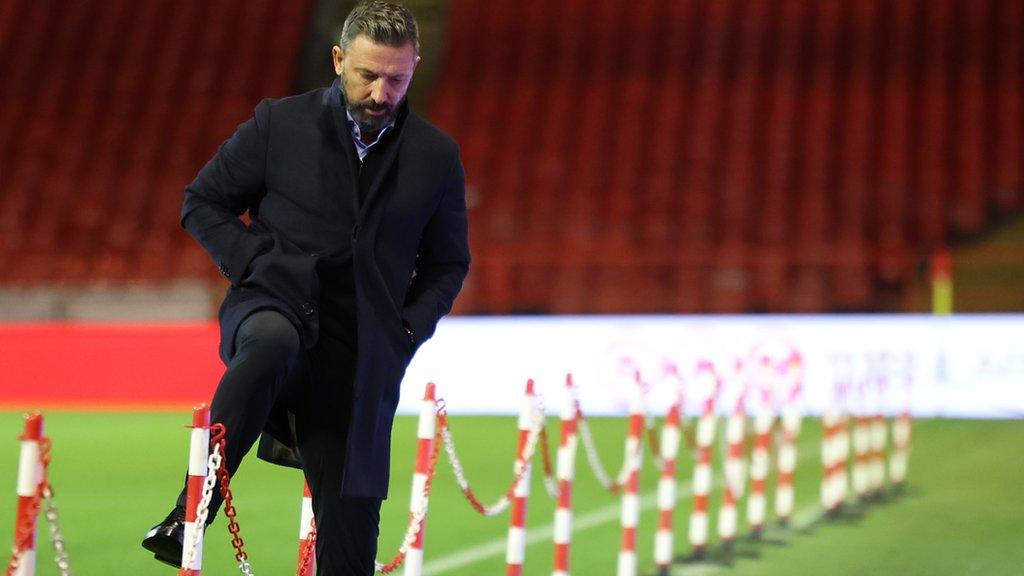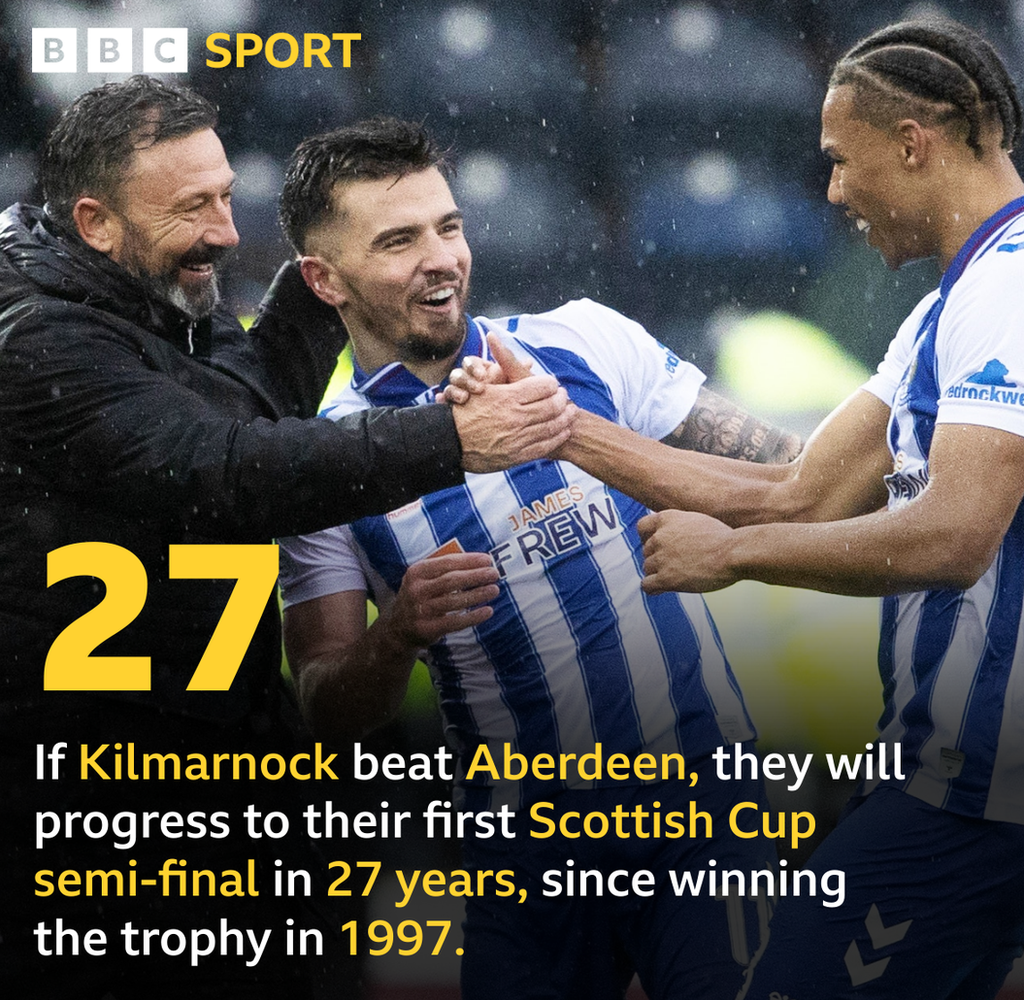Aberdeen v Kilmarnock: Why Derek McInnes' Pittodrie departure has been sliding doors moment for both clubs
- Published

Saturday's Scottish Cup tie at Pittodrie marks just over three years since Kilmarnock manager Derek McInnes left Aberdeen
Scottish Cup quarter-final: Aberdeen v Kilmarnock |
|---|
Venue: Pittodrie Stadium, Aberdeen Date: Saturday, 9 March Kick-off: 12:15 GMT |
Coverage: Watch on BBC One Scotland & iPlayer, listen on BBC Radio Scotland FM & BBC Sounds, live text commentary on the BBC Sport website & app |
What's that saying about sliding doors again?
It's a phrase that will come to the minds of many when Europe-chasing Kilmarnock rock up at relegation-fearing Aberdeen on Saturday.
If the contrasting trajectories of both clubs need to be pinned on one person, it's the man who will be standing in the visiting dugout at Pittodrie.
Three years to the day since his reign as Dons manager ended, Derek McInnes prepares to lead his Ayrshire side to the Granite City in a position of superiority.
Kilmarnock are five places and 14 points better off than Neil Warnock's Aberdeen, who are looking to haul themselves away from the unfathomable prospect of a first top-flight relegation
But it's a Scottish Cup semi-final place - something McInnes achieved five times in eight years at Pittodrie - the pair are playing for this weekend in front of the BBC Scotland cameras.
Here, we look at what's followed the Kilmarnock manager's Dons departure - and whether that's a decision the Aberdeen board may have come to regret.
Three years, three sackings & one under-fire board
Aberdeen said McInnes' eight-year stay ended mutually in March 2021. The announcement came as no real shock given speculation had been growing after a regression in results and performances. The team had failed to score in eight of McInnes' final nine games.
Despite that, the Dons were comfortable in fourth after 32 matches - and that's where they ended the campaign under Stephen Glass. Kilmarnock, meanwhile, were relegated via the play-off.
Glass had big boots to fill in his first permanent managerial role, but the club said his experience aligned with their philosophy of playing exciting football with homegrown talent and "competing and winning at the highest level possible".
Chairman Dave Cormack hailed the former Dons midfielder as a "bright, young, emerging manager".
He was sacked 11 months later with the club ninth in the table. Next came Jim Goodwin then Barry Robson, who both had contrasting playing styles to Glass and also failed to last more than a year.
In the two full seasons since McInnes left, Aberdeen ended 2021-22 in 10th - their lowest placing in 18 years - then achieved an unlikely third-place finish last term.
Now they find themselves back down in 10th having played 28 games. Interim manager Neil Warnock, 75, has taken charge of six of them and hasn't won any.
Aberdeen never finished below fourth in McInnes' seven full seasons at the helm. He also put a League Cup in the trophy cabinet and made it to three other domestic finals.
Cormack said he and McInnes agreed his departure was "the right time" - plenty on the outside agreed.
Three years on, McInnes says it's "up to others to judge" whether Aberdeen's demise backs up his body of work, but the level of sustained success he achieved seems a long way off for a club who look lost at present.
"We had a brilliant time there," McInnes adds. "We won the League Cup in our first year with a team with a lot of academy graduates. The budget I was working with at that time is night and day to what it is now.
"The biggest grievance is we never added to that, but we were very consistent with our work. That's somebody else's issue now. We're just trying to make our impact at Kilmarnock."
Final or fourth? McInnes 'can have both'

And what an impact he's making.
While Aberdeen have been hiring and firing, McInnes has had almost a year out, joined Kilmarnock, got them promoted and now has them well clear of his former side.
Yes, it hasn't all been rosy. Guaranteeing top-flight survival on the final day of last season probably wasn't where McInnes set the bar at the start of the campaign.
But Kilmarnock are now battling for a European place after a summer of shrewd recruitment, while players already at the club continue to improve and home form remains mightily impressive.
Aberdeen's philosophy seems to demand expansive football with homegrown players, but McInnes' Kilmarnock have shot more, scored more and conceded far fewer than his ex-club, all while having a lower average age.
Much was made of a drab style of play at the end of his Pittodrie tenure, but McInnes has deployed a bold 4-4-2 shape for a big chunk of this campaign, with wingers Danny Armstrong and Matty Kennedy often providing for a front two.
McInnes will hope that's a formula that works again on Saturday. While the old cliché of form going out a window could apply in a knockout tie, few would bet against the Ayrshire club making a first Scottish Cup semi in 27 years.
Asked whether he would prefer to make it to the final or finish fourth, McInnes' response was simple: "I can have both."
A fourth straight win over his former employers would be a big step towards achieving that.